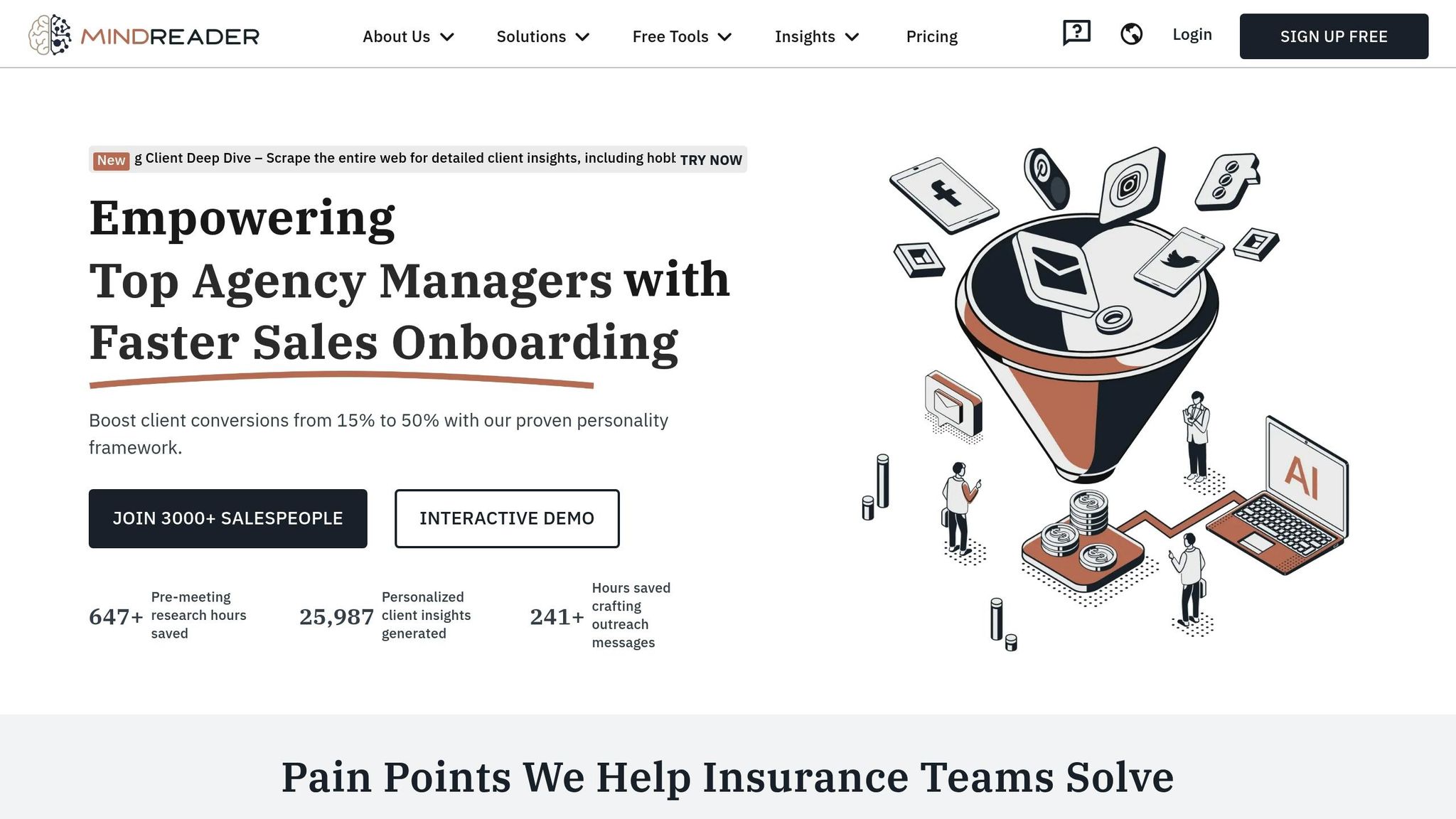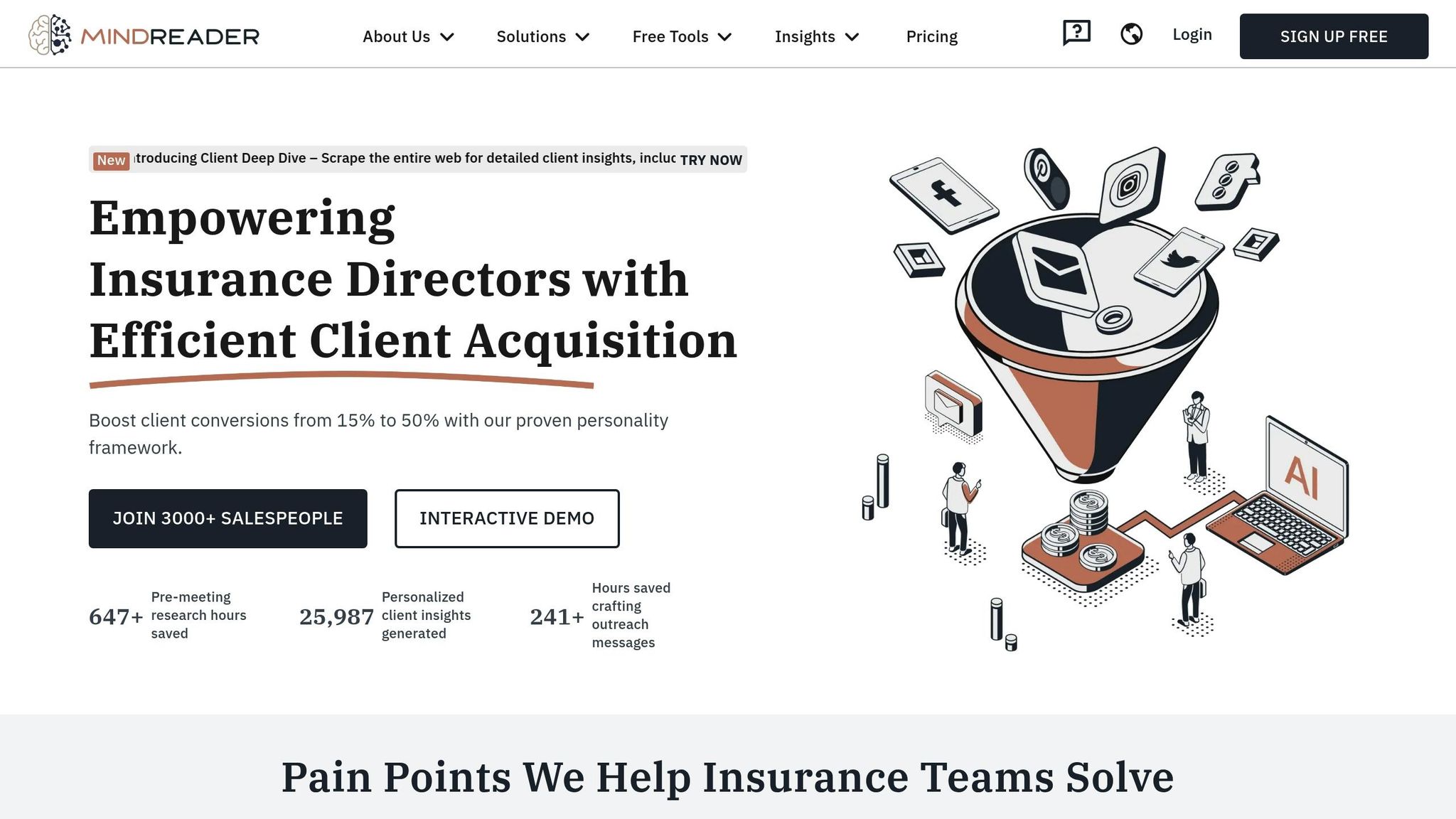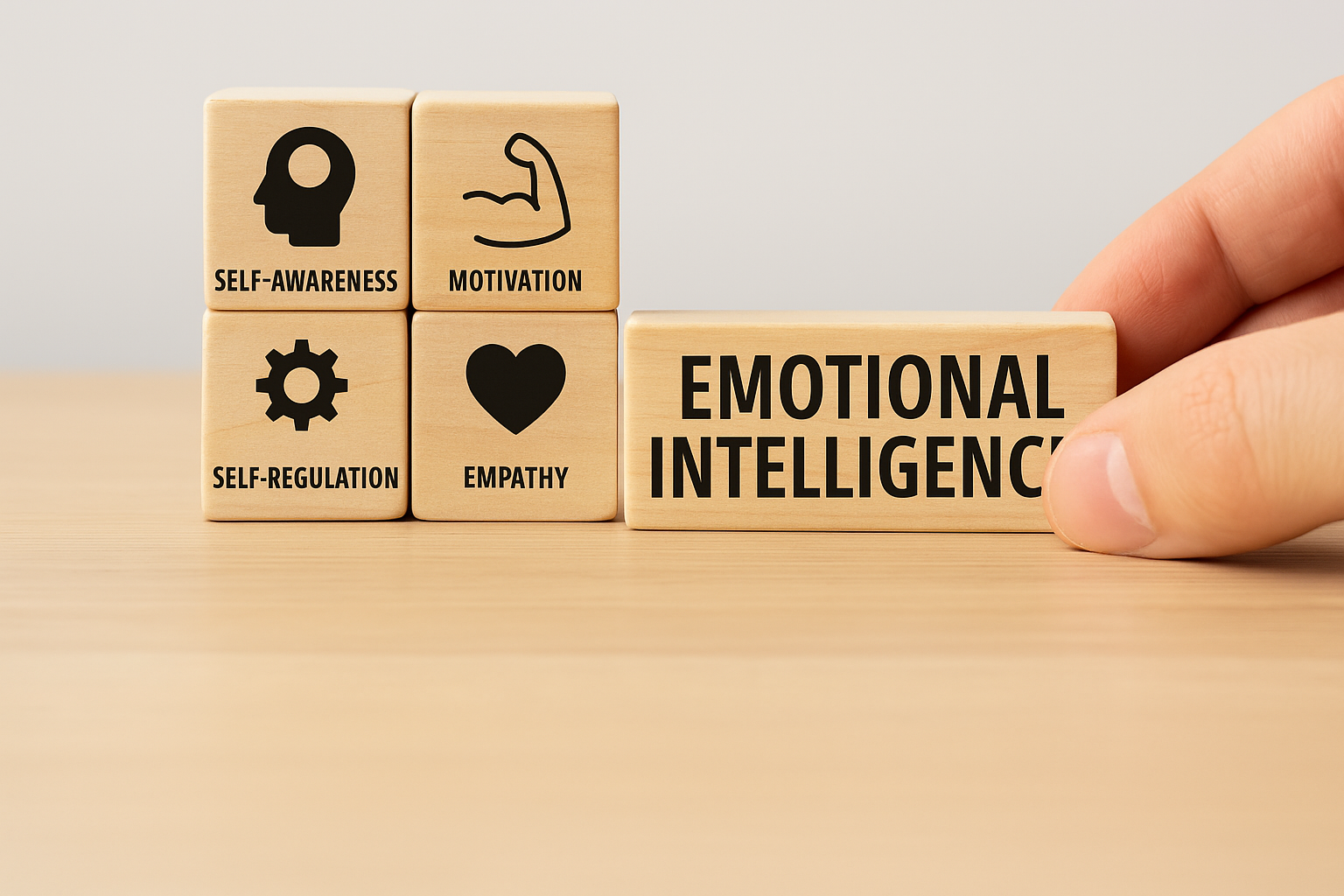Fact: Sales teams using emotional intelligence (EQ) can increase conversion rates from 15% to 50%.
EQ helps sales professionals handle rejection, connect with clients, and stay calm under pressure. Tools like Mindreader’s AI system make it easier to understand client personalities and tailor communication for better results. For example, a financial consultant achieved a 70% conversion rate by aligning their approach with client needs.
Key EQ Skills That Drive Sales:
- Self-awareness: Recognize emotional triggers to stay composed.
- Self-regulation: Manage reactions to client objections and reduce stress.
- Empathy: Understand client concerns to build trust.
- Motivation: Stay focused despite setbacks.
Personality Types and Tailored Sales Approaches:
- Knight: Use detailed data to build trust.
- Explorer: Highlight flexibility and engage through interaction.
- Healer: Emphasize purpose and emotional connection.
- Wizard: Focus on efficiency and facts for quick decisions.
AI Tools in Action:
- AI like Mindreader improves client profiling with 90% accuracy.
- Saves over 638 hours in research and boosts conversion rates to 70%.
The 4 Parts of Emotional Intelligence in Sales
Emotional Intelligence Basics
In sales, emotional intelligence (EQ) is more than just understanding emotions - it’s about using that understanding to navigate challenges, stay resilient, and close deals. The four main components - self-awareness, self-regulation, empathy, and motivation - form the foundation for success in this field.
| EQ Component | Sales Application | Impact on Resilience |
|---|---|---|
| Self-Awareness | Identifying emotional triggers during tough negotiations | Helps stay composed when deals hit roadblocks |
| Self-Regulation | Controlling reactions to client objections | Reduces emotional burnout |
| Empathy | Grasping client needs and concerns | Strengthens long-term relationships |
| Motivation | Staying driven despite setbacks | Keeps performance steady through challenges |
These elements work together to elevate sales strategies. By mastering them, sales professionals can enhance their communication and better align with their clients' personalities.
How EQ Strengthens Sales Performance
When salespeople apply these EQ components, they can fine-tune their approach for better results. Here’s how it works in practice:
"With just a quick assessment, I can guess a person's type with an accuracy rate of around 90%. As a result of implementing Mindreader's HIS system, my conversion rate has significantly improved to 70% [2]."
The secret lies in adapting your communication style to match your client’s personality type:
| Personality Type | Communication Approach | Results |
|---|---|---|
| Knight | Provide detailed comparisons and specifics | Builds trust through thorough analysis |
| Explorer | Highlight flexibility and use demonstrations | Engages clients through interaction |
| Healer | Focus on meaning and purpose | Fosters emotional connections |
| Wizard | Offer facts and efficiency-driven solutions | Encourages swift decision-making |
"I have learned how to sell the way my client wants me to! Different personalities require tailored language for clear communication. It puts a language to what we have been applying before on a trial and error basis [2]."
This personalized approach shows how EQ skills can lead to tangible results. Inefficient processes, for example, can cut closing rates by 20% and lead to a 17% annual drop in deals [2]. By sharpening EQ abilities and using the right tools, sales professionals can overcome these obstacles and maintain resilience in their performance.
Self-Awareness and Control in Sales
Recognizing Your Emotional Triggers
In sales, self-awareness begins with understanding how different client personalities and situations influence your emotions. Knowing what triggers you can help you stay composed and resilient.
| Client Type | Common Triggers | How to Prepare |
|---|---|---|
| Knight | Detailed questioning | Have thorough data ready in advance. |
| Explorer | Rapid topic changes | Stay flexible and ready to pivot. |
| Healer | Emotional discussions | Balance empathy with a focus on facts. |
| Wizard | Direct challenges | Build confidence through preparation. |
Using tools like personality AI before meetings can help you anticipate these triggers and plan your responses. This approach not only improves how you handle meetings but also strengthens your connection with clients [1].
But identifying triggers is just the start. The real key lies in managing them effectively to elevate your performance and refine your sales approach.
Managing Your Emotions
Once you recognize your emotional patterns and understand your client's style, managing your reactions becomes easier. For instance, research shows that using tools like Mindreader can boost conversion rates from 16–20% to 33% [1]. This jump is largely due to better control over emotional responses during client interactions.
"This has helped enhance my presentation and communication skills, so that I can focus on building stronger relationships with clients." [1]
Here are some ways to maintain emotional control during sales interactions:
- Spend 5 minutes profiling your client to understand their communication style and prepare mentally.
- Practice role-playing scenarios to build confidence and minimize anxiety.
- Pay attention to your emotions during meetings and adjust your approach as needed.
Using Empathy to Close Sales
Improving Listening Skills
Empathy can significantly boost conversion rates, increasing them from 15% to 50% [2]. It starts with truly understanding what your clients need.
Here’s how to sharpen your listening skills:
| Listening Component | Objective | Impact on Sales |
|---|---|---|
| Non-verbal Cues | Picking up on body language | Uncovers hidden concerns |
| Active Response | Reflecting back client statements | Builds trust and rapport |
| Strategic Silence | Letting clients speak freely | Reveals deeper needs |
| Emotional Awareness | Recognizing underlying feelings | Addresses core objections |
"Mindreader's AI-driven insights and preparation tools have completely transformed my workflow, making it easier to focus on what matters most: building relationships and closing deals with a clear, tailored strategy" [2].
Using AI tools for personality insights can further refine how you communicate empathetically.
Mindreader's Client Analysis Tools

Once you’ve mastered listening, understanding different client personality types takes empathetic engagement to the next level. Mindreader's Human Intelligence System categorizes clients into four personality types, each requiring a tailored communication approach:
| Personality Type | Communication Focus | How to Show Empathy |
|---|---|---|
| Knight | Details and comparisons | Use data to address specific concerns |
| Explorer | Freedom and flexibility | Validate their need for adaptability |
| Healer | Purpose and meaning | Connect on an emotional level |
| Wizard | Growth and achievement | Recognize their professional ambitions |
For example, a Financial Services Director successfully closed a deal with a high-net-worth Wizard client by applying this framework [2].
"This approach has refined my communication, allowing me to build stronger client relationships" [2].
Here’s what the system delivers [2]:
- 90% accuracy in personality profiling with fast assessments
- 10-15% increase in conversion rates for both qualified and non-qualified leads
- Over 25,800 personalized client insights generated so far
AI Tools for Better Emotional Intelligence
Using Mindreader for Client Analysis
Building on the earlier discussion of emotional intelligence (EQ), AI tools like Mindreader help fine-tune how teams interact with clients. Mindreader's HIS system analyzes client behavior through facial expressions and text, offering insights that improve confidence and adaptability in sales.
Here’s how its features support emotional intelligence:
| Feature | EQ Advantage | Impact on Resilience |
|---|---|---|
| Client Deep Dive | Better understanding of client motives | More confident client interactions |
| Role-play Practice | Improved emotional preparation | Lower anxiety before meetings |
| Personality Profiling | Stronger communication alignment | Fewer misunderstandings |
This system has already saved over 638 hours in pre-meeting research [1].
Linkleads: Smart Message Creation

AI doesn’t just analyze - it also helps craft better communication. Linkleads, for instance, creates messages tailored to client personalities, helping sales teams connect more effectively.
"With just a quick assessment, I can guess a person's type with an accuracy rate of around 90%. As a result of implementing the HIS system, my conversion rate has significantly improved to 70%" [2].
The platform delivers measurable results:
| Communication Aspect | Improvement |
|---|---|
| Conversion Rate | 15% to 50% increase [2] |
| Message Creation Time | 237+ hours saved [2] |
| Lead Response | 4X higher engagement |
| Client Understanding | 10–15% higher success rate [2] |
"I have learned how to sell the way my client wants me to! Different personality has different lingos that require us to present information in their easiest frequency. It puts a language to what we have been applying before on a trial and error basis. Now we have a more structured approach and know why we close or don't close a case" [2].
The blend of AI-driven insights and emotional intelligence creates a strong foundation for success. For example, Winson, an E-commerce Entrepreneur, used these tools to pinpoint client personalities and close a major business deal, saving $5,000 in under three hours [2].
From Transaction to Relationships: Leveraging Emotional Intelligence In Sales
Conclusion: EQ's Role in Sales Success
Focusing on self-awareness, empathy, and regulation, the results show how emotional intelligence (EQ) can directly influence sales outcomes. For instance, Mindreader's AI-powered insights have boosted conversion rates from 16–20% to an impressive 70% [2]. This highlights how EQ, paired with advanced tools, strengthens sales performance.
By combining deeper client understanding with accurate personality assessments, sales teams are seeing measurable benefits. These tools deliver 90% accuracy in personality profiling while saving over 638 hours in client research [1][2]. The time saved allows teams to focus more on building client relationships, which leads to higher closing rates.
Sales professionals have shared their experiences with these tools. Karen, a Senior Financial Services Manager at AIA, explains:
"I have learned how to sell the way my client wants me to! Different personality has different lingos that require us to present information in their easiest frequency. It puts a language to what we have been applying before on a trial and error basis. Now we have a more structured approach and know why we close or don't close a case" [2]
Nicholas Teo, a financial advisor, also shares:
"Mindreader's AI-driven insights and preparation tools have completely transformed my workflow, making it easier to focus on what matters most: building relationships and closing deals with a clear, tailored strategy" [2]
These examples show how mastering EQ, with the help of tools like Mindreader, equips sales professionals to communicate effectively and build stronger client relationships. The improvements in conversion rates and efficiency highlight the power of EQ-driven strategies supported by AI insights.
FAQs
How can emotional intelligence help sales professionals stay resilient and handle rejection effectively?
Emotional intelligence helps sales professionals stay resilient by equipping them with the tools to manage their emotions, stay focused, and bounce back from challenges like rejection. By understanding and controlling their own emotional responses, salespeople can maintain a positive mindset and adapt to difficult situations.
Additionally, emotional intelligence fosters better client communication by enabling sales professionals to empathize with prospects, read non-verbal cues, and tailor their approach. This not only helps build stronger relationships but also reduces the emotional toll of setbacks, making it easier to stay motivated and productive in the long run.
How can AI help sales teams use emotional intelligence to improve client relationships and boost conversion rates?
AI plays a key role in enhancing emotional intelligence for sales teams by helping them better understand and connect with clients. Tools like Mindreader use psychometric profiling - through quizzes, text analysis, or face recognition - to identify client communication styles and preferences.
With these insights, salespeople can tailor their approach to match each client's personality, making conversations more engaging and effective. This not only strengthens client relationships but also improves focus on addressing objections and closing deals, ultimately driving higher conversion rates.
How can sales professionals use emotional intelligence to adapt their communication to different client personalities?
Sales professionals can leverage emotional intelligence to better understand and adapt to their clients' unique personalities, improving communication and building stronger connections. By using tools like Mindreader, sales teams can profile clients' communication styles through psychometric insights and categorize them into personality types such as Knight, Explorer, Healer, or Wizard.
For example, a Knight values clear, direct communication with specific details, while an Explorer may prefer a more flexible and creative approach. Understanding these preferences allows sales professionals to craft tailored pitches, address hidden objections, and establish trust more effectively. Emotional intelligence, combined with advanced tools, empowers salespeople to navigate client interactions with confidence and precision.

